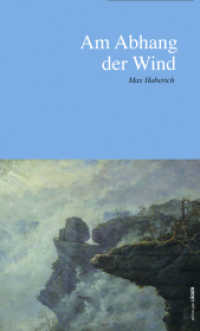- ホーム
- > 洋書
- > 英文書
- > Literary Criticism
Full Description
This book argues that literary production in Portuguese-speaking southern Africa has developed distinctive aesthetic idioms that critically respond to crises of global capitalism and related failures of post-colonial governance. Drawing from recent research at the intersection of world-systems analysis and materialist theories of world literature, it identifies and evaluates two generic trends in the post-independence literatures of Mozambique and Angola. From the mid-1980s to the early 1990s, there is a marked tendency in Mozambican literary production towards fictional representations of ghosts, spectral effects and gothic narrative techniques. In Angola, there is an analogous outburst of literary expression from the mid-1990s onwards, in which writers increasingly turn towards dystopian images of apocalypse, ecological crisis, and the disintegration of existing modes of social reproduction. Away from a restricted focus on the decline of the post-independence Marxist-Leninist state, the book contends that the upswing in these two genres of writing functions to critically register a world-systemic horizon that both surpasses and includes locally determined, national realities. The patterned repetition of spectral and dystopian forms in Portuguese-speaking southern Africa occurred at a time of heightened capitalisation, in which the region was subjected to newly expropriative forms of accumulation and ecological enclosure via integration into a reconstellated world-system headed by neoliberal finance capital. Through close readings of texts by authors such as Mia Couto, Suleiman Cassamo, Ungulani Ba Ka Khosa, Pepetela, and Ondjaki, this book asks: What factors drove literary production towards the figure of the spectre in Mozambique and towards dystopia in Angola? What emerging energies and social contradictions found shape in these generic idioms in ways that existing vocabularies were unable to express? What does the geo-temporal passage from spectrality to dystopia tell us about the history of capitalist development in southern Africa, and about the restructuring of political-economic parameters across the globe?
Contents
The Southern African World-System
Irrealism in the Balance
Spectres of Blood and Fire
Luanda Syndrome








